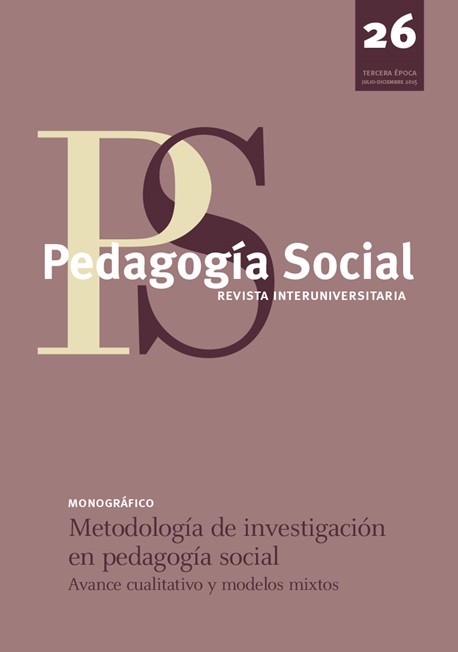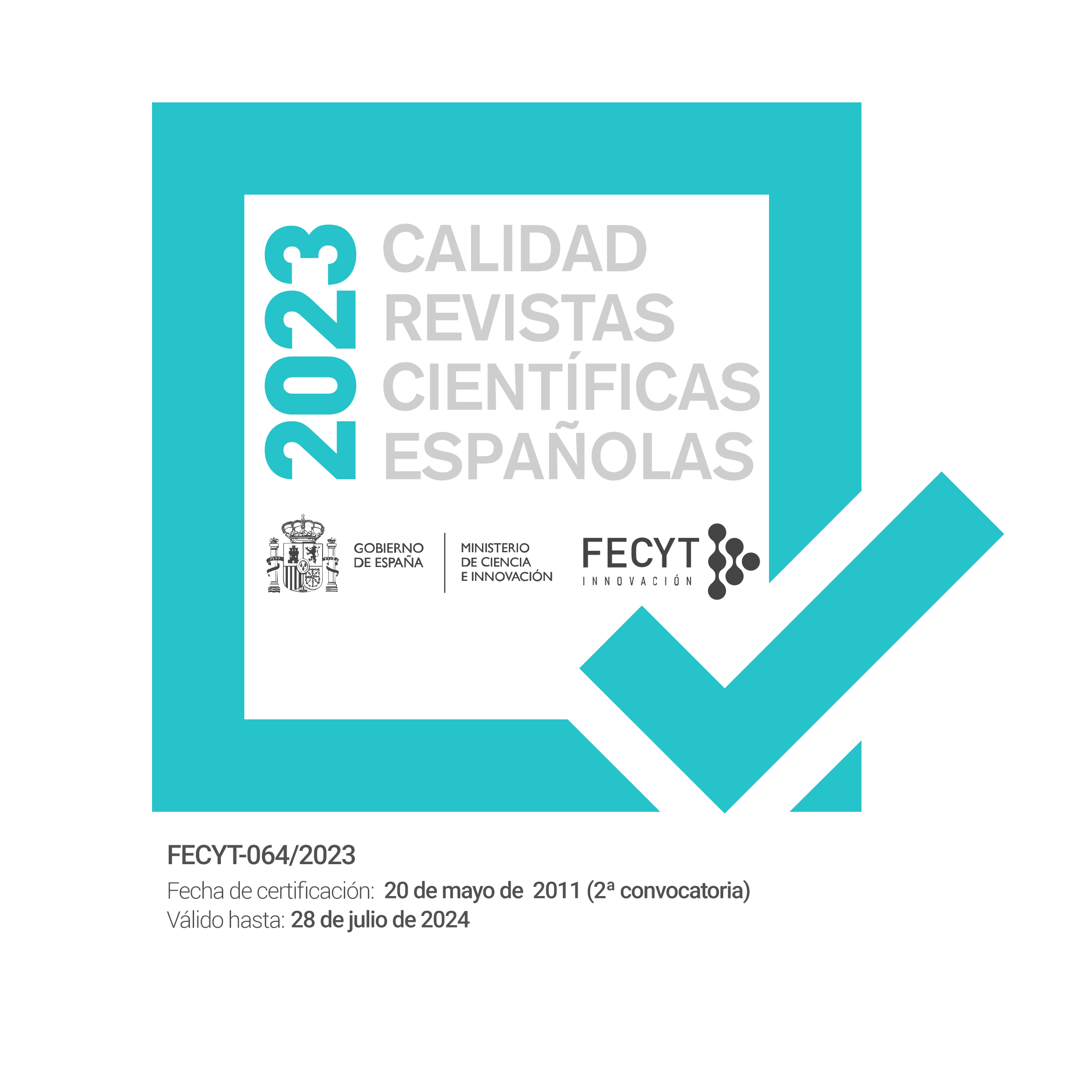Study on the academic future of second-generation immigrants in Setubal and Faro (Portugal)
DOI:
https://doi.org/10.7179/PSRI_2015.26.12Keywords:
Secundary education, second-generation migrant, expectations, Portugal, inclusion, integration, Portuguese-speaking AfricaAbstract
The research focuses on the Luso-African secondary school pupils studying in two of the Portuguese cities with the largest number of immigrants (Setúbal and Faro). Especially this cities, according to the latest data offered in Portugal by the National Institute of Statistics, in the near future these young people constitute the majority of the school population in many schools in the country and at the same time, a large portion of them will help to raise and high rates of dropout and failure. In order to facilitate the social inclusion of these students wanted to determine their expectations of their school career, taking into account social, family, economic, educational and school aspects.
After a relevant documentary study, we conducted a data collection based on the in situ observation and a vertebrate of questionnaire scales in seven groups: characteristics of their parents, school career, self-esteem, motivation to continue studying, expectations about the future professional, characterization and evaluation of the school context, and expectations after high school. Thus, variables relate concerning their social and family situation, your school career and social integration with their future prospects. Following the interpretation and analysis of the extracted data, among other findings, we argue that the most influential in the expectations of the Luso- African students who complete their secondary education factor is the interest of parents in the education of children
In order to facilitate the inclusion of socio students involved in migration processes, we aim to determine their expectations about their school. Especially because, according to latest data provided by the National Institute of Statistics in Portugal, in the near future these young people constitute the majority of the school population in many centers in that country and at the same time, much of it will help raise the actual high dropout and failure rates. Through our research we gather information from all the Luso-African secondary schools in two cities with the largest number of Portuguese immigrants (Setúbal and Faro). Data collection was performed using a questionnaire developed, aimed at the students of Portuguese-speaking Africa and was divided into seven major groups of scales: characteristics of parents, school career, self-motivation to continue studying, professional expectations about the future, characterization and evaluation of the school setting, and characterization of expectations after secondary school. The extracted data includes social, familial, economic, educational and school children of immigrants, called second-generation immigrants or Luso-Africans. Thus, we find relations between their prospects and their social and family situation variables that influence school and their school and their social integration. After interpretation and analysis of extracted data, we conclude that the most influential factor in expectations, with the Luso-African students who complete their secondary school studies, is the interest of the parents regarding the formation of the children.
Downloads
References
ACIME. (2005). Imigração, os mitos e os factos. Lisboa: autor.
Alba, R. (2005). “Bright vs blurred boundaries: second-generation assimilation and exclusion in France, Germany and the United States”. Ethnic and Racial Studies, 28, 20-49.
Arroteia, J. (2010). “Portugueses em diáspora: identidade e cidadania”. População e Sociedade, 18, 145-159.
Baganha, M. I. (2005). “Política de imigração: a regulação dos fluxos. En F. Carvalho, Descendentes de caboverdianos em Portugal. A questao identitária”. Lisbon: SociNova. Revista Crítica de Ciências Sociais, 73, 29-44.
Carrasco, S., Pàmies, J. & Bertran, M. (2009). “Familias inmigrantes y escuela: Desencuentros, estrategias y capital social”. Revista Complutense de Educación, 20(1), 55-78.
Carvalho, C., Boléo, M. & Nunes, T. (2006). Cooperação Família Escola: um estudo de situações de famílias imigrantes na sua relação com a escola. Lisboa: ACIME.
Checa, J., & Arjona, A. (2009). “La integración de los inmigrantes de “segunda generación” en Almería. Un caso de pluralismo fragmentado”. Revista Internacional de Sociología, 67, 701-727.
Etxeberria Balerdi, F., Arrieta, E., & Imaz Bengotxea, J. I. (2009). “Empleabilidad y formación de inmigrantes”. Pedagogía social: Revista Interuniversitaria, 16, pp. 105-115.
Fernandes, D. (2007). “A avaliação das aprendizagens no Sistema Educativo Português”. Educaçao e Pesquisa, 33(3), 581-600.
Fernández, J., Kressova, N., & García, F.J. (2011). “¿Construyendo interculturalidad? Análisis de las normas para "atender" al "alumnado inmigrante" en los asuntos relacionados con la enseñanza de la lengua vehicular en la escuela”. En J. A. Fernández Avilés y M. N. Moreno Vida (dirs.) Inmigración y crisis económica: retos políticos y de ordenación jurídica. (pp. 335-356) Granada: Comares.
Gans, H. (1992). “Second generation decline: scenarios for the economic and ethnic futures of the post 1965 immigrants”. Ethnic and Racial Studies, 15, 173-192.
García, F.J., Álvarez A., & Rubio M. (2011). “Prismas trasescalares en el estudio de las migraciones”. Revista de Antropología Social, 20, 203-228.
Giddens, A. (2004). Sociologia. Lisboa: Fundação Calouste Gulbenkian.
Guzmán, R., Feliciano, L. & Jiménez, A. (2011). “Dificultades de aprendizaje del alumnado inmigrante hispano: la perspectiva de los coordinadores de Programas de Educación Intercultural”. Revista de Educación, 355, Mayo-agosto 2011, 547-570.
Instituto Nacional de Estadistica (2009). Indicadores Sociais 2008. Lisboa: Author.
Instituto Nacional de Estadistica (2010). Indicadores Sociais 2009. Lisboa: Author.
Instituto Nacional de Estadistica (2011). Indicadores Sociais 2010. Lisboa: Author.
Leiva, J. (2011). “Participación de las familias inmigrantes y educación intercultural en la escuela”. Contextos educativos: Revista de educación, 14, 119-134.
Lúcio, A. (2008). “Prefácio”. En A. Peixoto, Imigrantes em Portugal: que propensão criminal? (pp.7-12). Ponta Delgada: Edições Macaronésia.
Machado, F. (2007). “Jovens Como os Outros? Processos e Cenários de Integração dos Filhos de Imigrantes Africanos em Portugal”. En A. Vitorino (Coord.), Imigração: Oportunidade ou Ameaça? Recomendações do Fórum Gulbenkian Imigração, (pp. 180-181). São João do Estoril: Principia.
Machado, F., Matias, A., & Leal, S. (2005). “Desigualdades sociais e diferenças culturais: uma análise extensiva e multidimensional dos resultados escolares dos filhos de imigrantes africanos em Portugal”. Análise Social, 40(176), 695-714.
Malheiros, J. (2010). “Portugal 2010: o regresso do país de emigração? Notas e reflexões”. Janus.net – e-journal of International Relations, 2(1), 133-142.
Morales, P. (2000). Medición de actitudes en psicología y educación: construcción de escalas y problemas metodológicos. Madrid: Universidad Pontificia de Comillas.
Patrício, M. (2008). “Portugal Intercultural: Razão E Projecto Volume Iv.10 - A Identidade Nacional Num Mundo Intercultura”l. Lisboa: Universidade Católica.
Perlman, J., & Waldinger R. (1997). “Second generation decline? Children of immigrants, past and present. A reconsideration”. International Migration Review 31, 1415-1430.
Pliego, N., & Valero, M. (2011). “Alumnos inmigrantes en España: una realidad creciente”. Hekademos, 8, año IV, 77-90.
Rodríguez, C., & Valdivieso, A. (2008). “El éxito escolar de alumnos en condiciones adversas”. Revista Latinoamericana de Estudios Educativos, 38(1-2), 81-106.
Rodríguez, R. Mª. (2010a). “Éxito académico de la segunda generación de inmigrantes en EEUU”. Revista Española de Educación Comparada, 16, 329-355.
Rodríguez, R. Mª. (2010b). “Éxito y fracaso escolar de los estudiantes de primera y segunda generación de origen inmigrante”. ESE. Estudios sobre educación. 2010, nº 19, p. 97-118.
Rodríguez, R. (2011). “Discontinuidad cultural: Estudiantes inmigrantes y éxito académico”. Aula Abierta, 39(1), 69-80.
Santos M. A., Lorenzo, M. y Priegue, D. (2011). “Infancia de la inmigración y educación: la visión de las familias”. Revista de Investigación Educativa, 29 (1), 97-110.
Seabra, T. (2008). Desempenho escolar, desigualdades sociais e etnicidade: os descendentes de imigrantes indianos e cabo-verdianos no ensino básico em Portugal. ISCTE, Lisboa: Tese de Doutoramento.
Seabra, T., & Mateus, S. (2010). “Trajectórias escolares, propriedades sociais e origens nacionais”. Sociologia: Revista do Departamento de Sociologia da FLUP, 20, 411-424.
Serviço de Estrangeiros e Fronteiras (2010). População estrangeira residente em território nacional 2009. Lisboa: author.
Silva, M. (2005). “Ser aluno «negro» na escola da grande cidade: imagens de professores”. Os Urbanitas - Revista de Antropologia Urbana, 2(1). Extraído el 14 de Diciembre de 2011, de http://www.osurbanitas.org/osurbanitas2/nomedoarquivo.html.
Thomson, M. y Crul, M. (2007). “The second generation in Europe and the United Status: how is the transatlantic debate relevant for further research on the European second generation?”. Journal of Ethnic and Migration Studies, 33, 1025-1041.
Vázquez, A., & Manassero, M. A. (2009). “Expectativas sobre un trabajo futuro y vocaciones científicas en estudiantes de educación secundaria”. REDIE [versión electrónica] 11, (1), pp. 1-20. Extraído el 27 de abril de 2012.
Vila, I., Esteban, M. y Oller, J. (2010). “Identidad nacional, lengua y escuela”. Revista de Educación, 353, 39-65.
Xie, Y., & Greenman E. (2005). Segmented Assimilation Theory: a Reformulation and Empirical Test. Documento de trabajo del Institute for Social Research: Universidad de Michigan.
Downloads
Additional Files
Published
Issue
Section
License
Copyright (c) 2015 Pedagogia Social. Revista Interuniversitaria

This work is licensed under a Creative Commons Attribution-NonCommercial 3.0 Unported License.
Copyright and right to archive
The published version of the articles can be self-archived by their authors in open access institutional and thematic repositories. However, Pedagogía Social. Revista Interuniversitaria must authorize partial or global reutilisation on new papers or publications.
Published papers must be cited including the title of the journal Pedagogía Social. Revista Interuniversitaria, issue, pages and year of publication
Ethical responsibilities
Pedagogía Social. Revista Interuniversitaria does not accept any material that has been previously published in other documents or publications. Authors are responsible for obtaining the required permissions for partial or global reproduction any material from other publications, and to correctly quote its origin.
Pedagogía Social. Revista Interuniversitaria is obliged to detect and report fraudulent practices.
Only those who have intellectually contribute to the development of the paper must appear as authors.
The journal expects authors to declare any commercial partnership that might entail a conflict of interest with respect to the submitted article.
Authors must mention in the article, preferably in the “methodology” section, that the procedures used during the samplings and controls have been made after getting informed consent.
The journal will not use any received contribution in a way other than the goals described in these guidelines.
Copyright Notice
© Pedagogía Social. Revista Interuniversitaria. Papers published in both the printed and online versions of this Journal are property of Pedagogia Social. Revista Interuniversitaria, being required to cite the source in any partial or total reproduction.
Unless otherwise stated, all content of this electronic journal is distributed under "Creative Commons Attribution-Non commercial 3.0 Spain" (CC-by-nc) license for use and distribution. The informative version and the legal text of this license is available here. This has to be expressly stated in this way when necessary.





